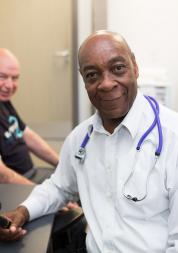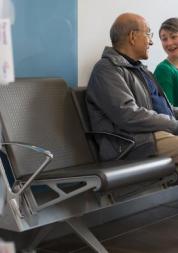GP access review must be part of NHS COVID-19 recovery

The COVID-19 pandemic has fundamentally shifted the way we use our GP practice. Instead of phoning for an appointment or walking-in to a surgery, access to care has rapidly moved to online bookings and video and phone consultations.
The move to remote appointments has allowed GP practices to keep services running for millions of people. As our previous research highlighted, remote consultations have made getting care quicker, more efficient and easier to fit around their lives for many people.
But, as our new report makes clear, many people are struggling to access care from their GP practice, leaving them feeling frustrated and confused. Certain groups also risk being left behind, such as older people, disabled people, people affected by homelessness and on low incomes, and those whose first language isn’t English.
What people told us
In an extensive review of people's access to GP services, we have analysed a range of sources, drawing on almost 200,000 people’s experiences shared between April 2019 and December 2020.
- Communication: Communicating information about changes to services because of COVID-19 has not been a top priority for all GP practices. As a result, people were confused about how to get in touch with their GP, whether they could make an appointment and how, and what to expect if they attended the surgery in person.
- Booking an appointment: Before the pandemic, we repeatedly heard about the problems people faced when booking appointments, particularly for working people and parents of school-aged children. While we heard very little about problems people had when contacting their GP practice in the initial lockdown, by autumn 2020, people started telling us about long waits when phoning services. People also told us about problems booking appointments because of triage systems and not being sure when their GP or other healthcare professional will call back, leaving people feeling anxious.
- Appointments not meeting people’s needs: Remote GP appointments haven’t met everyone’s needs. While telephone appointments are convenient for some, others are worried that their health issues will not be accurately diagnosed. These problems were exacerbated for disabled people, people with long-term health conditions, people without access to the internet and for anyone whose first language is not English.
- Access to regular treatment and medication: People also struggled to get appointments for regular health check-ups, treatments and medication reviews. As a result, they could not get the medication and treatment they need to manage their condition.
By December 2020, around 75% of people who contacted us reported a negative experience of accessing GP services, which is up 20% on the same point in 2019.
"My mother-in-law feels disempowered"
Cynthia 97-year-old mother-in-law, Norma, doesn’t have access to the internet. She contacted Healthwatch after becoming concerned about the sudden shift to electronic prescriptions.
“Pre-pandemic, and even in the early days of the pandemic, she would call the pharmacy next door to the surgery and ordered her medication. The pharmacy sent the request to the GP and then delivered the medication at a small charge. This worked well for her and allowed her a degree of control and privacy.
"The service was withdrawn about five months ago as the Practice introduced online prescription requests. The pharmacy said it would be too time consuming and expensive for them to be the point of prescription ordering. The GP practice could only suggest that someone else took responsibility for ordering the medication. I was told this was a problem for many of the older patients.
"My mother-in-law feels disempowered by the change and dislikes being dependent on others to manager her prescriptions. Expecting everyone to be able to access technology disadvantages the elderly and many others who don't have easy access to the internet."
Time for a national review of GP access
Our analysis shows that accessing GP services has been a long-standing issue for many people, which the COVID-19 pandemic has exacerbated. Therefore, we are calling on NHS England to undertake a formal review of the ways people access General Practice services to make sure they work for everyone.
The review needs to look at whether people understand the changes that have taken place and how these have affected the way they can get the care and support they need. This will help establish the changes that are working well and should be maintained and identify where GP practices need additional support to address access barriers.
Our report also recommends that NHS England should also:
- Ensure that information is provided and maintained on all GP websites about how to contact the GP to book an appointment and ask for help. This should include updated information about how the practice/surgery has changed or altered the way it delivers its services during the COVID-19 pandemic.
- Support GP practices to consider how patients may have different communication needs and adapt the method of communication accordingly.
- Ensure GP practices are supported to better record and identify people with additional needs, with indicators such as carer identifiers, language support needs, and disability support needs.
- Provide support for call handling training for staff using telephone systems. This will ensure that staff are well equipped to deal with concerns over the phone and are familiar with the software, equipment and supporting the patient.
- Work with partners to improve how they collect and report on the types of appointments that GP practices are offering.
- Expand and strengthen new regulations that now require GP practices to record ethnicity data where it is given.
Commenting on the findings, Healthwatch England Chair Sir Robert Francis QC said:
“GPs are a vital first port of call for people who need care; they are the main ‘gatekeeper’ to other services. If people cannot get through to a GP, not only can their health and wellbeing be put at risk, but demand on already overstretched hospitals gets worse. People will go to A&E if there is nowhere else to go, and their condition may deteriorate, leading to increased treatment and care because they couldn’t get help sooner.
“The shift to remote care during the pandemic has understandably happened extremely quickly, but there is little evidence that people have been consulted about how they view these changes. As we move out of the pandemic, thanks to the success of the vaccination programme, the NHS has a great chance to address how everyone chooses to access GP services, as well continuing the improvements brought about by new ways of offering the service.
“We urge NHS England to undertake a formal review of GP access arrangements to make sure it is working for everyone. It is important that people understand the changes brought in during the pandemic are here to stay and how that affects the way they can get the care and support they need.”
Read the report
Read the report to find out what people told us about their experience of accessing their GP during COVID-19.

